During my recent playthrough of the new PS4 exclusive God of War, I noticed that I actually missed the quicktime events that were made famous (and marketable) by the original PS2 God of War. I liked the first two PS2 God of Wars' brutal treks through Greek mythology, but I wasn't a die-hard fan. I was always more of a Devil May Cry kind of guy. So I was surprised to feel nostalgic over a feature that had been removed from those games. I was double-surprised by the fact that I was nostalgic over a feature that most of the gaming community (including myself) has come to despise.
The series that popularized quicktime events has seemingly abandoned them.
Quicktime events (or "QTE", or "Quick Timer Event" as it was called in the manual for Shenmue) were a fairly innovative and well-received feature when the first God of War released in 2005, and that game received perfect scores from many critics. At the time, QTEs were considered an excellent way of providing a flashy, cinematic moment, while still maintaining the interactivity of the player experience. In the case of God of War, this was mostly accurate.
Then the imitators started rolling in (and have been continuing to roll in ever since), and many (if not most) implementations of QTEs have fallen flat on their faces and infuriated players and critics. Trash like Spider-Man 3 was just embarrassing. Even otherwise "good" games, like Resident Evil 4 have been tarnished by poor executions of QTEs. Many games have ditched traditional QTEs in favor of similar button-mashing or prompted actions. The new PS4 God of War is a prime example. But these are basically the same thing.
Spider-Man 3 has some of the most egregiously-bad QTEs that I can remember.
In the years since the original God of War, QTEs have become a bane on gaming, and many players would like to see them completely gone. In fact, many developers have begun phasing them out. Sony's PS4 God of War is, again, a prime example. But I'm not so sure that QTEs deserve the automatic and unconditional hate that they receive. So I want to spend some time to take a look at what usually makes QTEs work, what usually makes them not work, and whether there may actually be merit to including them in future video games... [More]
20234e41-eedb-488f-8df6-a6c8093cd74e|3|4.7
Tags:quicktime event, quick timer event, button mashing, trap, cutscene, God of War, Shenmue, Spider-Man, Bayonetta, Sony, SCE Santa Monica Studio
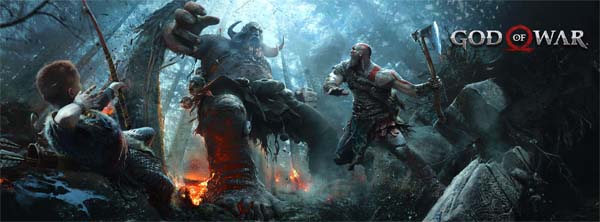
Vikings and norse mythology seems to have been a popular concept in games recently. Hellblade: Senua's Sacrifice, for instance, is an excellent hack-n-slash adventure through Norse hell. I've also been playing the Wasteland-like RPG Expeditions: Vikings on Steam (which I'm hoping to review soon). I also have games like Mount & Blad: Viking Conquest and Total War: Thrones of Britannia on my short list of games I'd like to play. And there was also the Viking character in For Honor.
Now, Sony's PlayStation flagship God of War has jumped from Greek mythology to Norse mythology. Having killed all the Greek gods, Kratos has apparently settled down in the mythological Midgard with a wife and son, only for his wife to die and his son be attacked by the Norse god Baldr. This sends Kratos and Atreus on a father-son bonding adventure to spread Atreus' mother's ashes from the highest peak in all the realms, and to learn why the Aesir are suddenly keen on hunting them.
Norse mythology seems to be a popular subject in media lately.
A father-son murder team
Atreus has some of the same problems that The Last of Us has with Ellie. Atreus doesn't feel vulnerable enough to demand protection, and he's rarely relevant outside of combat, except for his running commentary about what you're doing. Because of this, the actual game rarely feels like it's about protecting or escorting Atreus. And even though the game is ostensibly about Kratos teaching Atreus how to fight and be a man, the player never has an opportunity to actually teach the kid or take on any parental responsibility for him. It's just about Kratos throwing axes at draugr, and Atreus occasionally shoots them or jumps on their heads to help you out. The puzzle sections rarely require using Atreus (other than occasionally shooting something with his bow or having him scamper through a small tunnel).
Atreus is basically just an extra ranged attack.
That being said, I think that God of War makes some strides in the right direction (compared to The Last of Us). The player (and Kratos) can command Atreus to attack a target with his bow, which is one of the easiest and most consistent ways to deal stun damage to enemies, which opens them up to an intant-kill attack from Kratos. It's also a strategy that is pretty much essential on the harder difficulties. This creates a much greater sense of playing in tandem with Atreus, as he and Kratos often work together to defeat foes.
Atreus and Kratos can also break each other out of being grappled or stunned. I've never gotten a "Game Over" as a result of Atreus being defeated, so I'm not sure if that's a possible fail state. Being grappled or stunned only seemed to ever temporarily take Atreus out of the fight and negate the ability to use his bow. Either way, this is an improvement over Ellie from The Last of Us, who (as far as I recall) operated entirely independently from Joel, was never at any risk, and could be completely ignored for most of the player's time actually playing the game.
Kratos and Atreus can break each other out of enemy grapples and support each other in combat.
The important take-away here is that, unlike with Ellie in the combat encounters of The Last of Us, I never forgot that Atreus was there when playing God of War... [More]
569c96c8-73ad-4401-b3d2-4d2c9f75a74d|1|5.0
Tags:God of War, PlayStation 4, PS4, Sony, Sony Interactive Entertainment, exclusive, SCE Santa Monica Studio, sequel, Kratos, Atreus, Baldr, Freya, Magni, Modi, Midgard, World Serpent, escort quest, axe, Viking, Norse mythology, mythology, quicktime event, shifting the goalposts

The video game developer and distribution platform-owner Valve has announced that it will no longer moderate game submissions to Steam, and will instead "allow everything", so long as it is not blatantly illegal or "straight up trolling". This comes after literal years of complaints from players about the poor quality of games being submitted on the platform, and years of failed attempts by Valve to shut down or limit such releases. Apparently, they are just giving up.
Valve executive Erik Johnson made this announcement on an official blog post today, in which he defended the change in policy as a matter of protecting free speech rights.
"If you’re a developer of offensive games, this isn’t us siding with you against all the people you’re offending. There will be people throughout the Steam community who hate your games, and hope you fail to find an audience, and there will be people here at Valve who feel exactly the same way. However, offending someone shouldn’t take away your game’s voice. We believe you should be able to express yourself like everyone else, and to find others who want to play your game. But that’s it."
-- Erik Johnson, Valve executive, official blog
I'm a huge proponent of free speech, and a firm opponent of censorship, but I'm not sure if this move from Valve is the right one. For me, this is less an issue of free speech and censorship, and more an issue of quality control. Steam is already inundated with crappy, barely-working games that are phishing for people's money. People have been submitting, and charging consumers for, blatant asset-flips, Unity tutorials, copy-pasted rip-offs and clones, achievement farms, and all sorts of other low-quality, minimum-effort games and "fake games". In essence, Valve is enabling illigitimate developers to sell defective merchandise to the public, and Valve is directly profiting off of those sales. Does this represent a conflict of interest? Is Valve under a perverse incentive to facilitate the sale of as much crap as it possibly can?
That doesn't even include larger indie debacles like Life of Black Tiger, which actually saw a release on PSN as well! It also doesn't include the vast array of Early Access titles that may or may not at some point be released as "complete", fully-functional titles.
Yes, it is nice that indie developers (especially budding young ones) have a platform on which to publish their work. However, the flood of games on the platform is not necessarily good for the consumer. Even if all the games that were submitted to Steam were quality games submitted by honest developers in good faith, the shear volume of games would already make it difficult to weed through to find what you are looking for.
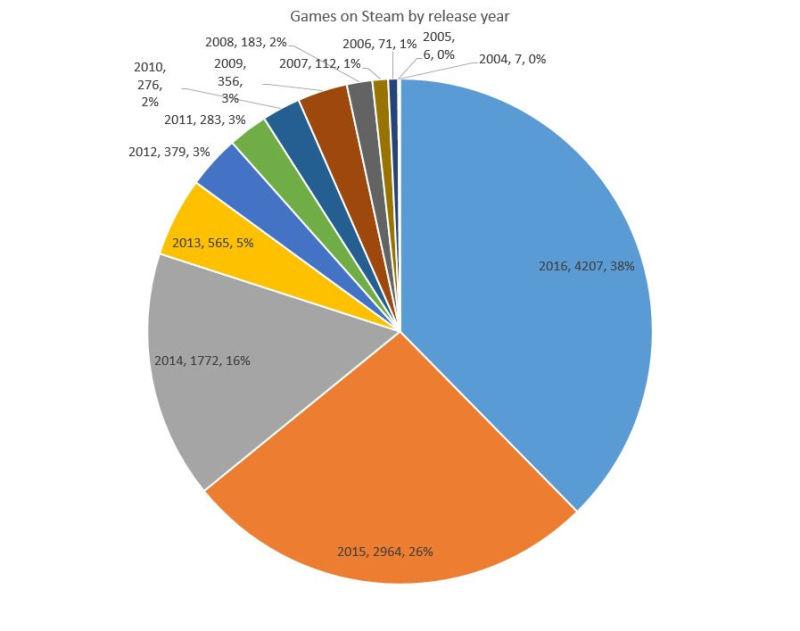
Almost half of all games ever released on Steam were released in a single year.
Source: Steam Spy.
Instead of doing their own moderation or quality-control, Valve apparently intends to release a suite of controls intended to allow end users to filter out content that they don't want to see... [More]
397aecb2-8914-4766-aae9-7a6fe2b8fd6b|1|5.0
Tags:Steam, Valve, censorship, free speech, indie gaming, PC, Poe's Law, toxic fandom, political correctness, Abstractism, cryptocurrency, malware
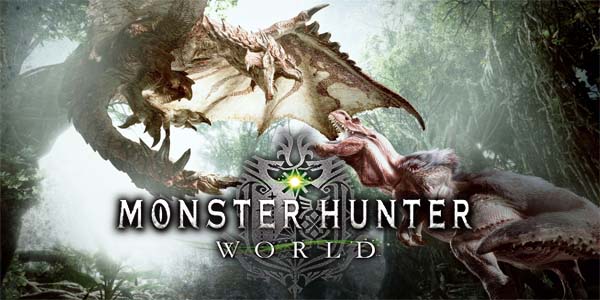
I've been playing Monster Hunter: World off-and-on since it was released (which was a few months ago at this point), and I'm still just not sure that I get it yet. The game just hasn't clicked for me. Maybe I haven't invested quite enough time yet. In the past, I've come around to games that initially turned me off with their tedium and/or difficulty. Demon's Souls is perhaps the prime example, as that game took a few days (almost a week) of banging my head against the walls of the Boletarian Palace before things started to click for me. It certainly didn't take months! Once Demon's Souls started to click, the game almost immediately became one of my all-time favorites.
The Demon's Souls comparison is apt. Corners of the internet keep insisting that Monster Hunter: World is a game that should appeal to the same types of players who love Dark Souls (because everybody keeps forgetting that Demon's Souls did it first and better). Well, I'm sorry, but I just don't see how the two connect.
Yeah, there's the difficulty. But Dark Souls isn't good because it's hard. It's good because all the pieces around that central challenge make overcoming that challenge feel worthwhile. It's the world-building, the lore, the way that the obtuse characters and dialogue builds a growing sense of intrigue about the world, the sense of nervously tip-toeing into a dangerous unknown, the sense of leveling your stats into a character build that perfectly suits your desired playstyle, and that ominous sense of entropic dread that permeates every nook and cranny of the game. Those things make Dark Souls good! Those sorts of things are lacking in Monster Hunter: World.
The JRPG nonsense that usually turns me off of JRPGs
Sadly, Monster Hunter: World is bogged down by a lot of the kinds of JRPG nonsense that has frequently turned me off of playing these sorts of games. While I often appreciate that JRPGs tend to be more story and character-driven (something that I often wish western RPGs would focus more on), JRPGs also tend to undercut the seriousness of the stories they're trying to tell with lots of silliness and whimsy. Sometimes it's charming or endearing; other times it's juvenile or obnoxious.
You can track monsters by following their footprints or by studying their snot and turds.
I can tolerate this game's silly little cat side kicks. Monster Hunter's whimsical fantasy setting works well enough. What is less tolerable is that the game is littered with tedious, grindy, time-killer quests: harvest so many mushrooms, investigate a bunch of dinosaur footprints and [literal] crap, kill however many small monsters, capture yet more small monsters. and yadda yadda yadda. I guess, at a certain level, these activities make a certain amount of sense. Your character is, after all, one grunt in a whole army of grunt hunters being sent out to do the dirty work of the captains. But I have better things to do in real life than to wander around a forest picking flowers for 50 minutes.
Monster Hunter is loaded with grind quests.
Some of these sorts of quests are relegated to little ambient side-quests that you can perform while you're doing other major missions. These are the ones that are tolerable. Others (like the Investigations and other tangential story quests) require you to perform dedicated ingredient-gathering grind missions, in which the sole purpose of the mission is to fight monsters you've already fought and collect a bunch of stuff. Since my character doesn't have traditional stats or levels that improve as I complete these quests, the grinding just never really feels worth it.
I was hoping that I could just power through the main quests and skip all the tedious grind stuff. No such luck. I got to a point where I had to hunt the T-Rex-like Anjanath, and got stuck... [More]
1b9f660c-f850-4553-965f-73076071e14f|3|3.0
Tags:Monster Hunter, Monster Hunter: World, Capcom, JRPG, RPG, dinosaur, dragon, palico, cat, pet, monster, grinding, time limit, hunt, nature, research, ecosystem, food chain, asynchronous multiplayer
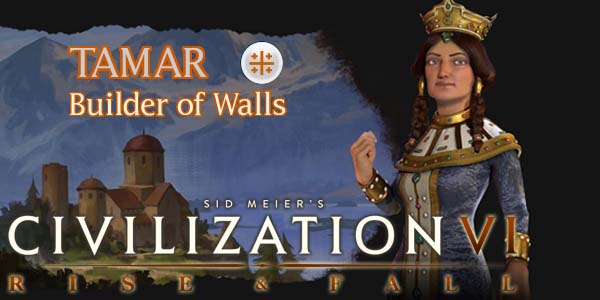
Civilization VI's first expansion, Rise & Fall released a couple months ago, and it introduced a few leaders and civilizations that are making their first appearance in the franchise. I hope to be able to write strategies for every one of the expansion civs and leaders, but I'm going to start with the ones that are new to the franchise, and the ones that most utilize the expansion's new features (Era Score, governors, loyalty, and so on). The first civilization that I will tackle will be the Georgian civilization, lead by Queen Tamar.
The feuding Georgian kingdoms in the Caucusus were first united under Bagrat III between 1008 and 1010 AD, after he tricked his cousins (the heads of feuding houses) into a false reconciliatory meeting, only to throw them into prison and ensure that his son would become heir to the kingdom. A few years later, however, that son would become a prisoner of the Byzantines as part of a peace deal after Bagrat's failed attempt to reclaim the ancestral city of Tao from the Eastern Roman Empire.
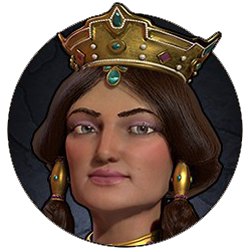
The Georgian empire reached its height under the rules of King David IV and Queen Tamar in the 12th and 13th centuries. These monarchs took advantage of the decline in Byzantine power and filled the power vacuum by claiming lands lost by the Byzantines. During this time, art and literature flourished, and Georgia developed its own architectural styles. Ecclesiastic art was dominant, but this period also saw some of the first major secular works of art and literature. This period would eventually become known as the Georgian Renaissance (or "Eastern Renaissance"). The renaissance continued under Tamar's rule, who proved adept at statecraft. She mediated internal tensions within her kingdom, and even thwarted a coup by her Russian husband, all the while protecting her kingdom from Turkish invasions and claiming Muslim lands to the east and south.
The Kingdom of Georgia's golden age would eventually come to an end at the hands of invading Mongols in the 13th century. The kingdom would be fractured, and the ensuing Black Death would ensure that Georgia would never again reach its former glory.
DISCLAIMER:
Civilization VI is still very early in its life-cycle (particularly the Rise & Fall expansion. Strategies for the game (and for specific leaders and civs) may change as Firaxis applies balance patches, introduces new features, or expands the game through further DLC or expansion packs, or as the Civ community discovers new strategies or exploits. As such, the following strategy guide may change from time to time. I will try to keep it up-to-date, and will make notations whenever changes are made. I'll also post links in the official 2K forums and CivFanatics, where I'll also report any changes made. If possible and practical, I will try to retain the original content of the strategy for posterity.
I welcome any feedback or suggestions that readers wish to offer. Feel free to post on the linked forums, or by posting a comment at the bottom of the page.
This guide is up to date as of the March 2018 patch (ver. 1.0.0.229)
In Civilization VI: Rise & Fall, Georgia is a defensive and religious civilization that thrives in its golden ages. Tamar is a bit of a religious world policewoman who builds strong relationships with city states that share her faith, and who will aggressively protect her city state allies. [More]
851c8f8a-f6ab-4afc-92d8-5eafc6a09aa4|0|.0
Tags:Sid Meier's Civilization, Civilization VI, Georgia, Tamar, strength in unity, glory of the world kingdom and faith, Narikala Fotress, Tsikhe, Khevsur, protectorate war, casus beli, city state, suzerain, envoy, religion, faith, golden age, era score, unique building, unique melee unit
|

| 12 | | | | | | | 60 | | 11 | | | | | | | 55 | | 10 | | | | | | | 50 | | 09 | | | | | | | 45 | | 08 | | | | | | | 40 | | 07 | | | | | | | 35 | | 06 | | | | | | | 30 | | 05 | | | | | | | 25 | | 04 | | | | | | | 20 | | 03 | | | | | | | 15 | | 02 | | | | | | | 10 | | 01 | | | | | | | 05 |
|